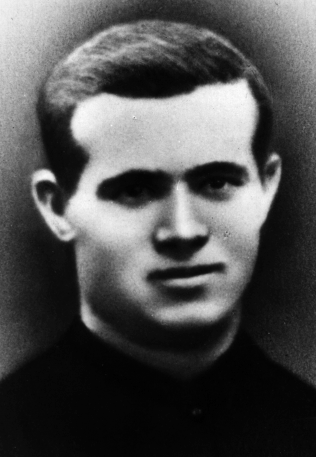
Jun 11, 2022 | From the martyrs
Claretian Missionary. 23 years old. Student of Theology. He was born in Almatret, a small village of the Province and Diocese of Lérida, Spain, on August 18, 1913. The early death of his mother meant that José María based his formation on the care of his father and teachers. It is not surprising in José María that he always had a somewhat dour character, although with a sympathetic manner, “frank and open, and a well-developed sense of justice”. His teacher, impressed by the boy’s qualities, suggested that he go to a seminary for religious. – And what would I be?” asked the boy. – Well, perhaps a great sage. The fact is that José María, with the intuition of a child, saw that it was God’s plan, for to the companion who wanted to discourage him, he replied calmly: “I have a vocation, and only God can take it away from me”. And to his father, who visited him in the Seminary and tested him by telling him why he did not leave once he had taken advantage of his studies, he said: “No, that would be misbehaving with the Congregation. Besides, I have a vocation and I want to be true to God’s call”. Thus disposed, she entered the novitiate and was professed in the Congregation of the Missionary Sons of the Heart of Mary on 15 August 1930. On the final day of his studies, he was martyred on 13 August 1936. Before his death, he signed his name with a patriotic and religious “Viva España Católica”. He was beatified by Pope John Paul II on 25 October 1992.
Blessed Fr. Claret the Thinker
Since there are many different prisms that refract the light of reality towards God, according to the perfections under which we consider him, Fr Claret chose his eternity. The thought of eternity was like a magic wand and set in motion all the forces of his heart. Already as a child, when he was four or five years old, when he could not sleep, he would sit on his bed and there, in holy reflection and with his eyes looking at heaven, he would spend the hours thinking of the terrible “always”… “never” of the sufferings of hell; making numerical calculations about eternity and never reaching the end; considering the eternity of God, he had the things of this world in their just value, seeing their passing, their limited reality and little consistency, and the vaporousness of time; absorbed in these contemplations his spirit was burning with the love of the Lord and he was encouraged to pray for the conversion of sinners and the dying.
Later, when he was trying to make his choice of state, moved by the memory of eternity that had been so deeply engraved on him in his childhood, and having given up the flattery that the world offered him, he courageously embraced the priestly vocation, and once he had climbed the steps of the holy altar, he tirelessly travelled through Spain, the Canary Islands, placed himself at the service of Propaganda Fide, went to Cuba, preaching everywhere the “tempus non est amplius”, “there is no more time”, this was the vertex around which the activity of Fr. Claret; this was the motive of his preaching and writings; this was the end to which he directed all his efforts in conquering souls for Jesus Christ.
Another fruit of the thought of eternity was the motto that, like a faithful soldier of Christ, he displayed on his coat of arms, the ardent “charitas Christi urget nos”, the charity of Christ and the zeal for the salvation of souls urges me; seeing the brevity of time and how much has to be done to win the world for Jesus Christ stimulates and urges me in such a way that I feel my breast burning with the desire to travel the whole world and save it with the preaching of the doctrine of Jesus Christ and the brevity of human things.
Fr Claret was certainly not mistaken in considering the things of this world in this way, for how was it possible for it to be so, if he considered everything in relation to God to whom it belongs by essence to be unchangeable, eternal, the centre of our happiness and the supreme reason for all that exists?
May God raise up many men like Claret who preach the eternity of God and the finiteness of what is before our eyes, and make the different classes of the present society come a little more to their senses. Oh! If we were to consider things through the prism of eternity, that is, if we were thinkers, how different the men of the present century would be, and how different the spiritual world of souls would look.
José M. Ormo C.M.F.
Cervera, January 28, 1934.

Apr 14, 2022 | From the martyrs
Claret and Balmes! It was not just the whim of a few writers that brought these two illustrious names together. It was the providential hand of God that, by forming with these two red tongues of fire a single flame, a flame of light and a flame of life, illuminated the dark and difficult paths of the Spanish nation in the last century.
The year 1840 arrived and the two defenders of the Catholic cause entered the battlefield at almost the same time. In April, Balmes published his first book in defence of the Catholic clergy. In August of the same year, Father Claret began his famous series of missions, which worked wonders in innumerable villages throughout Spain.
It is truly wonderful to contemplate the life of the Sallentine apostle, so virtuous, so fruitful, illuminated many times by the splendour of miracles, and always crowned by the splendour of holiness. But who can forget the treasure of science that is the multitude of his principles, the abundance of knowledge that his incessant preaching demanded, full of luminous ideas and always based on Sacred Scripture and the writings of the Holy Fathers and Doctors of the Church.
Balmes’ literary output was large, sufficient to form a library. But this eminent wisdom and prodigious fecundity, supported always by a perfect submission to the authority of the Church and a humble devotion to the Rosary, gave to the spirit of the Catalan philosopher that constant elevation, sincerity and purity which in the Sallentine apostle was shining with flashes of eminent holiness.
Both athletes took to the field, using the same weapons of combat, for both had moulded their minds in the same way. Thus, the saintly Archbishop Claret wrote in his Plan of Studies for the Seminary of L’Escorial: “Whatever author is explained in the classrooms, if you want to know theology, always keep before your eyes the Summa of St Thomas”. And Balmes said: “In the Summa of St Thomas one finds everything: Philosophy, Religion, Law, everything is, as in a cocoon, in those laconic sentences that contain within themselves unimaginable riches of science”.
And why not say so? Close spirits also showed us Claret and Balmes, when the hand of tribulation and calumny was knocking at their doors. When the good intentions of the author of “Pius IX” were misinterpreted, the humble philosopher replied to a friend who urged him to defend himself: “Truth, virtue, conscience, God, it is precisely this that we must look at; the rest will soon pass. And when the hour of probation came for the confessor of Isabella II and the holy archbishop of Cuba, and when he was calumniated and defamed in newspapers, magazines and brochures, as perhaps no other saint had ever been, he consumed in the silence of his heart the bitter bread of calumny and defamation; and with his heart turned to God and his face serene, he marched resolutely into exile.
Claret and Balmes! Here are two like-spirits, two fraternal hearts, two ideas that sprang at the same time from the will of God. They were the ‘two solid gold cherubim whose wings covered the Mercy seat of the Spanish Church in the 19th century’. Honour to their illustrious names!
José Brengaret Pujol


Jun 3, 2021 | From the martyrs
Nobody is unconscious of the abnormal state of Spain in the last century; the wars and internal revolutions, the frequent changes of government. In this critical period, the Venerable Father Claret appeared in the palace of the history of the country, to carry out one of the most important functions, that of Confessor to the Queen.
Although it was so easy in the palace to become entangled in matters outside his ministry, he was always completely separated from politics, as those who knew him closely assure us, and he himself affirms it when he writes: “I have never wanted to get involved in political matters” (Autobiography, part III, chap. 12). It is not to be believed that this is why the Venerable forgot to intimate to Elizabeth II her duties as Queen, as Fr. Aguilar notes in the “Vida admirable del Siervo de Dios” (Life of the Servant of God).
In purely political matters he behaved with the greatest circumspection. So says the Most Rev. Archbishop of Granada, Don Bienvenido Monzón in a letter dated 14 January 1880 with these words: “I believe that Mr. Claret, in his circumstances, knew how to reconcile the simplicity of the dove with the necessary cunning of the serpent, so as never to become entangled, nor allow himself to be bound up in the secret palace plots, nor in the intrigues and heated struggles of the political parties that were vying for power and taking the reins of government out of his hands, in order to conserve intact and inviolable the holy liberty and independence of his sacred ministry”.
That this is the genuine spirit of the Venerable is confirmed by the rule he prescribed for his Missionary Sons. It reads: “They should abstain from politics except for the sake of religion and obey the dispositions of the civil authorities as long as they do not oppose divine or ecclesiastical laws” (Constitutions, part II, ch. 16).
And he complied with it practically, by signing the Queen’s recognition of Italy, separating himself from her side; and not returning to court until he was ordered to do so by Pius IX himself.
Conduct worthy of imitation in all times and which should be the norm for the Spanish clergy.
Sebastián Riera, C.M.F.
– Taken from “Martyrs Honoring the Father Founder” (Cervera 1934).
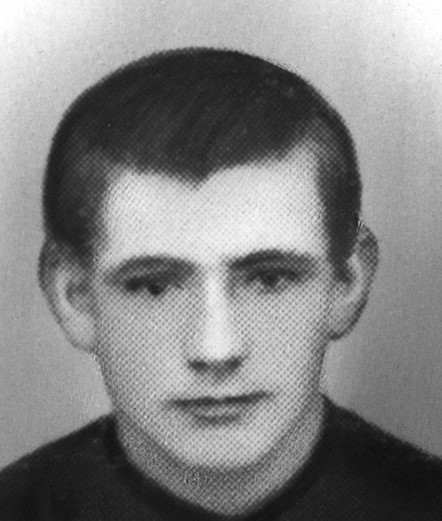
Apr 4, 2021 | From the martyrs
“I am determined to keep well all the Rules of the Holy Constitutions, even if they are small… To prepare myself well every day to receive Holy Communion… To do my meditation well and for that, I will prepare myself very well before beginning it…” (Resolutions of 4 February 1935). (Resolutions of February 4, 1935).
“O Jesus, make me truly love You with all my heart as You loved me… Make me belong to Your banner (sic)…”





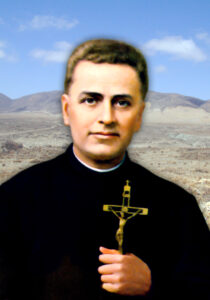
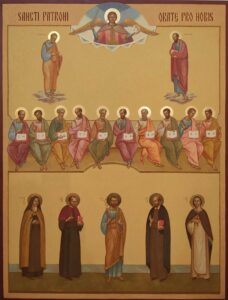
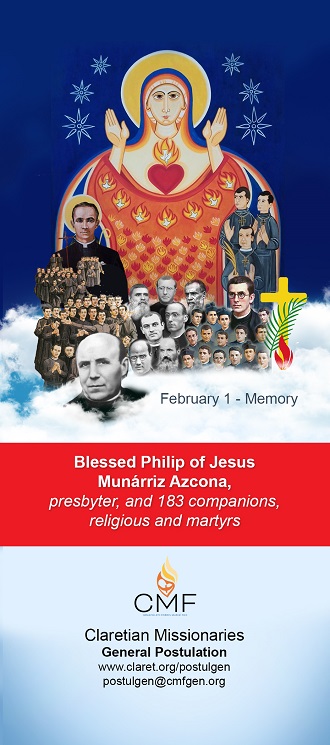
You must be logged in to post a comment.